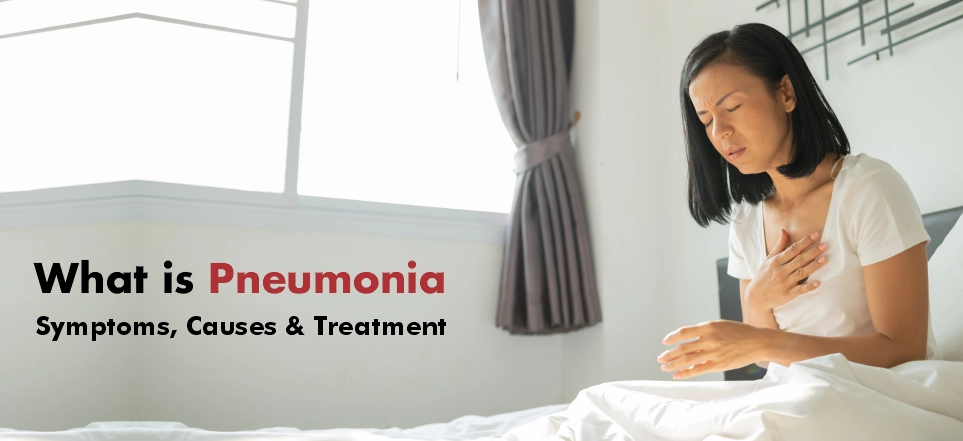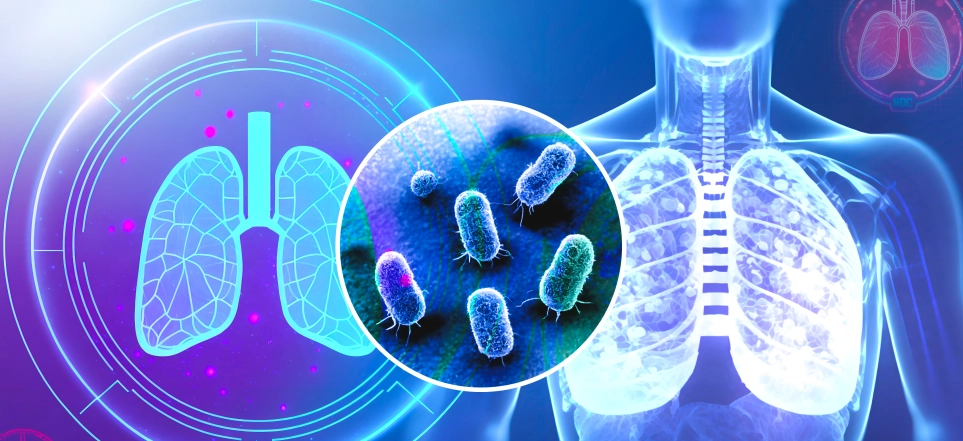


[vc_row][vc_column][vc_column_text]Have you ever had a cough that just wouldn’t go away or felt like you were running a fever for longer than usual? You might have brushed it off as a common cold or flu, but there’s a possibility it could be something more serious: pneumonia. It is a common illness that affects the lungs. Variety of factors, from bacteria to viruses to fungi. It can range from mild to severe, and in some cases, it can even be life-threatening. But what exactly is pneumonia, and what are the symptoms, causes, and treatments? In this blog post, we’ll take a closer look at this respiratory illness and provide you with everything you need to know.
It is a respiratory illness, there are different types, each with its own unique characteristics. Understanding the different types of pneumonia is important because it can help guide the treatment and management of the illness.
Community-acquired pneumonia (CAP) is the most common type of pneumonia. As the name suggests, CAP is acquired outside of a hospital or healthcare facility. Bacteria, viruses, or other microorganisms and usually begins as an upper respiratory tract infection. Symptoms of CAP can range from mild to severe and may include cough, fever, chest pain, and difficulty breathing.
HAP is a type of pneumonia that develops during a hospital stay. Variety of bacteria, including antibiotic-resistant strains, and is more likely to affect people who are already sick or have weakened immune systems. Symptoms of HAP are similar to those of CAP, but may be more severe.
It occurs when food, drink, or other substances are inhaled into the lungs, causing an infection. It is more common in people with conditions that affect swallowing, such as stroke or Parkinson’s disease. Symptoms of aspiration pneumonia can include cough, fever, chest pain, and shortness of breath. There are other less common types, such as fungal and viral pneumonia. It’s important to consult with a healthcare professional if you suspect that you or a loved one may have pneumonia, as the type of pneumonia and the underlying cause will influence treatment options.
It is caused by a variety of factors, including bacteria, viruses, fungi, and other microorganisms. In some cases, more than one type of microorganism causes it. Understanding the cause is important because it can help guide the treatment and management of the illness.
Bacterial Infections: Bacterial infections are a common cause of pneumonia. Streptococcus pneumonia, also known as pneumococcus, is the most common bacterial cause of pneumonia in adults. Other bacteria that can cause pneumonia include Haemophilus influenzae, Legionella pneumophila, and Mycoplasma pneumoniae. Antibiotics are typically used to treat it.
Viral Infections: Viral infections are another common cause.. Influenza viruses, respiratory syncytial virus (RSV), and adenovirus are examples of viruses that can cause pneumonia. Viral pneumonia is usually less severe than bacterial pneumonia, and symptoms may include fever, cough, and shortness of breath. Treatment may include antiviral medications, but in many cases, the illness will resolve on its own.
Fungal Infections: Fungal infections can also cause it, particularly in people with weakened immune systems. Fungal pneumonia is more common in people who have underlying conditions such as HIV/AIDS or cancer or who have received an organ transplant. Treatment for fungal pneumonia may include antifungal medications.
Other Causes: In addition to microorganisms, there are other factors that can cause pneumonia. The aspiration of food, drink, or other substances into the lungs can cause aspiration pneumonia. Other causes include exposure to certain chemicals or environmental irritants and certain medications. It’s important to consult with a healthcare professional if you suspect that you or a loved one may have pneumonia. A healthcare professional can help determine the cause and recommend appropriate treatment options.
Pneumonia is a respiratory infection that can range from mild to severe. The symptoms can vary depending on the cause of the illness and the health status of the affected person. It’s important to be aware of the symptoms, so that you can seek medical attention if you suspect you may have the illness.
The most common symptoms include:

In some cases, pneumonia can cause less common symptoms, including:
If you experience any of these symptoms, it’s important to seek medical attention. It can be a serious illness, particularly in older adults, young children, and people with underlying health conditions. A healthcare professional can diagnose pneumonia and recommend the appropriate treatment.
It is a respiratory infection that can range from mild to severe. If you suspect that you or a loved one may have pneumonia, it’s important to seek medical attention as soon as possible. Your doctor will use a combination of methods to diagnose pneumonia and recommend the appropriate treatment.
Treatment for pneumonia will depend on the cause of the illness. In most cases, pneumonia can be treated with a combination of medication and home care. The goal of treatment is to clear the infection, relieve symptoms, and prevent complications.

Pneumonia is a serious respiratory infection that can cause a range of complications, especially in vulnerable populations such as the elderly, infants, and people with weakened immune systems. However, there are several ways to prevent pneumonia and reduce your risk of developing the illness.
One of the most effective ways to prevent pneumonia is to get vaccinated. There are two main vaccines available for it: the pneumococcal conjugate vaccine (PCV13) and the pneumococcal polysaccharide vaccine (PPSV23). These vaccines protect against the most common strains of bacteria that cause pneumonia. In addition, getting an annual flu shot can also help reduce your risk of developing pneumonia, as the flu can often lead to pneumonia.
Another way to prevent pneumonia is to practice good hygiene. This includes washing your hands regularly with soap and water, especially after being in public places, and avoiding close contact with people who are sick. If you do get sick, make sure to cover your mouth and nose when coughing or sneezing to prevent the spread of germs.
Smoking can damage your lungs and make you more susceptible to respiratory infections such as pneumonia. If you smoke, quitting is one of the best things you can do to protect your lung health and reduce your risk.
Maintaining a healthy lifestyle can also help prevent. This includes eating a balanced diet rich in fruits and vegetables, getting regular exercise, and getting enough sleep each night. A healthy lifestyle can help boost your immune system and reduce your risk of developing infections.
Pneumonia is a serious illness that can affect anyone, but with the right knowledge and actions, it can be prevented and treated. You can take the necessary steps to protect yourself and your loved ones with a properly understanding of the symptoms, causes, and treatment options for pneumonia. Remember to seek medical attention if you experience any symptoms follow your doctor’s instructions for treatment and recovery. At Amandeep Group of Hospitals, we understand the importance of respiratory health and offer a range of services to diagnose and treat respiratory illnesses, including pneumonia. Our team of experienced doctors and staff are committed to providing high-quality care to our patients and ensuring their well-being. If you or a loved one is experiencing symptoms , don’t hesitate to reach out to us for a consultation.
FAQ
A. Yes, It can be contagious depending on its underlying cause. Bacterial and viral pneumonia are the most common types that can spread from person to person through contact with respiratory secretions of an infected person. It is important to take precautions to prevent the spread, such as covering your mouth when coughing or sneezing and washing your hands regularly.
A. It can be deadly, especially in people with weakened immune systems, infants, and elderly people. It is a leading cause of death worldwide, responsible for about 15% of deaths in children under the age of 5. Prompt diagnosis and treatment with antibiotics, antivirals, or antifungal medications can help prevent serious complications and improve outcomes. However, if left untreated or if treatment is delayed, It can lead to severe respiratory failure, sepsis, and death.
A. COVID-19 pneumonia is more deadly because it is caused by the SARS-CoV-2 virus, which is highly contagious and can spread rapidly from person to person.
A. It is a mild form of pneumonia that often goes unnoticed or is mistaken for a common cold. It is typically caused by the bacteria Mycoplasma pneumoniae and can be spread through coughing and sneezing.
A. Some groups of people are at a higher risk, including infants and young children, adults over the age of 65, people with weakened immune systems, individuals with chronic lung or heart conditions, and smokers.
A. The recovery period can vary depending on the severity of the illness and the underlying cause. In general, it can take a few weeks to several months for a person to fully recover.
A. You should consult a pulmonologist or a respiratory physician. These doctors specialize in diagnosing and treating diseases related to the respiratory system.
A. Yes, pneumonia affects the respiratory system. It is an infection that causes inflammation and irritation in the lungs, leading to the accumulation of fluid and pus in the air sacs, which can make it difficult to breathe.[/vc_column_text][/vc_column][/vc_row]
September 30, 2024
Recognize the Signs: Understanding Appendicitis Pain Symptoms
September 24, 2024
Unveiling the Truth: I-Pill Side Effects Every Woman Should Know
We use cookies to enhance your experience. By clicking "Accept", you agree to our use of cookies.